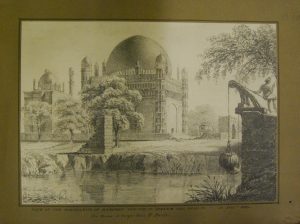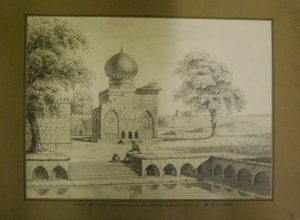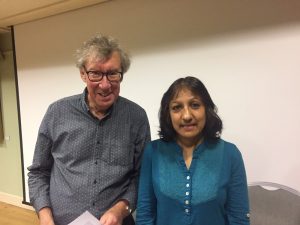General John Briggs (1785-1875)
John Briggs was an officer in the East India Company army. He entered the Madras army in 1801 and accompanied Sir John Malcolm on his mission to Persia in 1810. Briggs took part in the Mahratta wars, also serving as a political officer under Malcolm. He became an assistant to Mountstuart Elphinstone before succeeding Grant Duff as resident at Sattára. In 1831 Briggs was appointed senior member of the board of commissioners for the government of Mysore but resigned in 1832, when he became Resident at Nagpur. In 1835 he retired from this position and returned to England. After his return to England he became part of the Court of the East India Company. He opposed Lord Dalhousie’s annexation policy. He was also an active member of the Anti-Corn League.
Briggs was elected a fellow of the Royal Society in recognition of his proficiency in oriental literature. He was a Persian scholar, and translated Ferishta’s Mohammadan Power in India, and the Siyar-ul-Murákhirin, which recorded the decline of Moghul power. He was also the author of an essay on the land tax of India, and in a series of Letters Addressed to a Young Person in India he discussed questions on the conduct of army officers, and civil servants, and especially their treatment of Indians. He was a member of the Royal Asiatic Society, contributing articles to its journal and was elected as a Vice-President in 1863.
He died, aged 89, on 27th April 1875 (hence his commemoration in this week’s blog) at Burgess Hill, Sussex. During his time with the Society Briggs donated books and Indian manuscripts. He also donated three drawings that he had made of Bijapur:



These drawings and his manuscripts and books are available to be viewed in our Reading Room. More details can be found on our Library catalogue. And, on the theme of Indian architecture, a series of photographs of architectural views of India has been added to our Digital Library. Here is one but do go across to the site to see all of them.

In other news, the Society hosted two events this week. On Tuesday 23 April we welcomed Dr. Talat Ahmed who, in conversation with Professor David Arnold, discussed her new book, “Mohandas Gandhi: Experiments in Civil Disobedience”. Gandhi remains an inspiration for peace activists. This new biography examines his campaigns in South Africa and India, looking to asses their successes and failures and highlighting the contradictions that may be found in Gandhi’s activism and philosophy. We were delighted to be able to hear about Dr Ahmed’s research and wish her every success with the book.

On Thursday 25th April we welcomed Dr. Simon Wolfgang Fuchs from Albert-Ludwigs-Universität, Freiburg who lectured on “When Tehran was the Brightest Star: A Global History of the 1979 Iranian Revolution”. His lecture highlighted the historic political context for the Revolution and the intellectual impact of it, which provoked a lively discussion following the lecture.

We want to thank these speakers for the time taken in preparing these presentations to the Society. We would also like to take the opportunity of inviting you to next week’s event. On Thursday 2 May, 6.30 pm, author, Philip Davies , will launch his new book “Lost Warriors- Seagrim and Pagani of Burma – The Last Great Untold Story of WWII”. The book uncovers the remarkable story of two extraordinary British soldiers who remained behind enemy lines to fight in one of the most brutal and significant campaigns of WWII. Long overlooked in comparison with the war in Europe, the Allied campaign against the Japanese in the jungles of Burma was the scene of some of the most important events to shape the outcome of the war in the Far East. We hope that you will take the opportunity to hear more about their lives.
